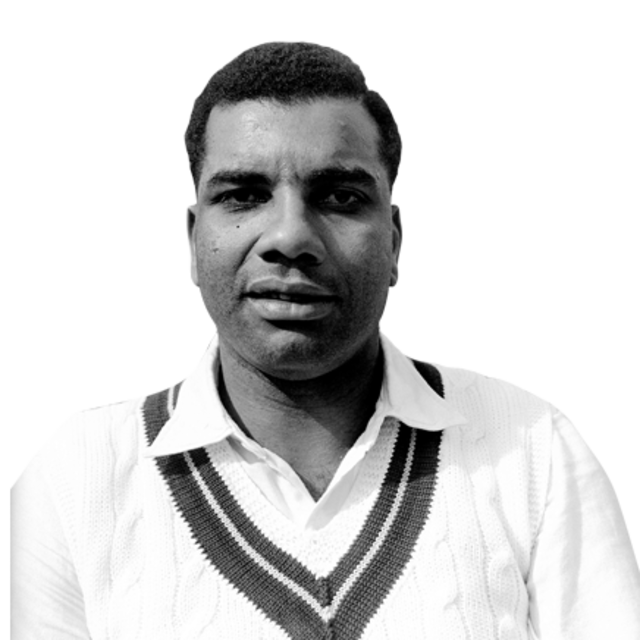Clyde Walcott
West Indies
INTL CAREER: 1948 - 1960
Full Name
Clyde Leopold Walcott
Born
January 17, 1926, New Orleans, St Michael, Barbados
Died
August 26, 2006, Barbados, (aged 80y 221d)
Also Known As
Sir Clyde Walcott
Batting Style
Right hand Bat
Bowling Style
Right arm Fast medium
Fielding Position
Wicketkeeper
Height
6ft 2in
Education
Harrison College, Barbados
RELATIONS
(brother),
(son)
Other
Referee, Coach, Administrator, Commentator
No young fan of today could appreciate the extent of the excitement that surrounded West Indies' first Test victory on English soil. Sir Clyde Walcott was a member of that multiracial 1950 team and the thrill of it all never dulled for him or any of his contemporaries. (Only Everton Weekes and Sonny Ramadhin remain.) When, almost half a century later, Walcott became chairman of the ICC, based at that same Lord's ground, it rounded off a life full of high achievement. Walcott scored 168 not out in that historic Test and kept wicket while the amazing young spinners Ramadhin and Alf Valentine bowled 231 overs together, 145 of which were maidens, taking 18 wickets against a semi-petrified England line-up that included Len Hutton, Cyril Washbrook and Bill Edrich but lacked Denis Compton. Just enough Caribbean folk mustered at Lord's to bring to the historic match a glorious afterglow.
Next Test, at Trent Bridge, Frank Worrell (261) and Weekes (129) completed a vivid enactment for English audiences of the famed Three Ws, a triumvirate unique in cricket history, a combination of power and elegance, each challenging for the title of world's best and all born on the little island of Barbados within 18 months of each other, Walcott the youngest, on January 17, 1926. Educated at Combermere School and Harrison College, he had marked his 16th birthday with his first-class debut. When fully developed he resembled another Walcott, "Jersey Joe", the American heavyweight boxer. His strokeplay carried the same sort of paralysing punch. At his peak, like Viv Richards later, he was one of those rare power-packed batsmen to whom bowlers preferred not to bowl on a long afternoon. At 20 Walcott made 314 not out in a world-record unbroken fourthwicket stand of 574 with Worrell in an inter-island match at Port-of-Spain. It is not easy to picture him crying "like a baby", but by his own account in his autobiography Island Cricketers that is what the heat and humidity did to him as he batted in India for the first time in 1948-49, reaching his hundred with a six he could not later recall. There he made the first and second of his 15 Test centuries (the rapacious Weekes blazing four of five on the trot, starting with the one in the previous series at home against England, and being run out for 90 next innings).
The world had nothing to show comparable to the thrilling Three Ws but, when they toured Australia in 1951-52, they were halted, mainly by the hostile bowling of Lindwall and Miller. Only the languid Worrell of the trio made a century in West Indies' 4-1 defeat. Walcott, hampered by back trouble and relinquishing the keeper's gloves, managed only one half-century in his six Test innings. Massive compensation came on Walcott's home pitches. When India visited a year later he hit a 98 and two hundreds and in the following season, in a classic 2-2 series with England, he hammered 220 on his home track and 124 in Trinidad in the fourth Test, when for the second time all three Ws reached three figures in the same innings. Another century in the lost final Test (Garry Sobers's first) took his series tally to 698 at 87.25. And that was still not the peak, for a year later, when Australia visited the Caribbean for the first time, Walcott smashed five awesome hundreds, twice registering two in a Test. This time his aggregate was 827 (82.70) against the unlikely backdrop of a 3-0 series win by Australia.
Following a miserable series in England in 1957 he had the pleasure of escorting Sobers to his Test record score of 365 not out against Pakistan at Kingston (Walcott was a terrifying vision to be coming in at 602 for 3) and he followed with a century at Georgetown; but after two appearances against England in the sour 1959-60 series his career of 44 Tests ended. His average remains a mighty 56.68. Walcott, who had battered Lancashire league bowling (having an average of 600 for Enfield at one point), worked for cricket's advancement in his native island and in Guyana. He was West Indies tour manager, a selector and then board president before succeeding Colin Cowdrey as ICC's figurehead. In 1993 he was created Knight of St Andrew, Order of Barbados. Finding himself in need of material to lighten the many speeches he was now called upon to make, he once telephoned inquiring after any good cricket joke books. This contrasted intriguingly with the long-ago vision of a young autograph hunter by the SCG pavilion in 1952 who fled when scolded by Walcott for what he perceived as presumption. The reality was that Clyde Walcott preferred to laugh and accompanying the vision of his powerful strokeplay, for those who watched him and knew him, his deep voice resounds still - like his shots, an unforgettable mix of silk and gently rolling thunder.
David Frith, The Wisden Cricketer
Terms of Use|Privacy Policy|Your US State Privacy Rights|Children's Online Privacy Policy|Interest - Based Ads|Do Not Sell or Share My Personal Information|Feedback
© 2024 ESPN Sports Media Ltd. All rights reserved
